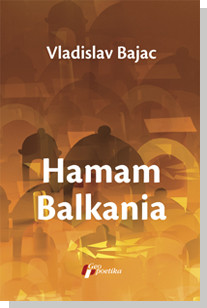
Hamam Balkania
Translated from the Serbian by Randall A. Major
Godina izdanja: 2009
Format (cm): 20 cm
Broj Strana: 363
ISBN:
Cena: Rasprodato

Hamam Balkania
Vladislav Bajac
Translated from the Serbian by Randall A. Major
Godina izdanja: 2009
Format (cm): 20 cm
Broj Strana: 363
ISBN:
Cena: Rasprodato
Izdavačka kuća Geopoetika, uz pomoć Ministarstva kulture Republike Srbije, pokrenula je ediciju Serbian Prose in Translation/ Srpska proza u prevodu.
Ovaj projekat podrazumeva kontinuirano, sistematsko i organizovano objavljivanje dela savremenih srpskih pisaca na strane jezike, za početak na engleski, i na taj način predstavlja širenje srpske kulture u svetu.
Knjige iz ove edicije prodavaće se isključivo na srpskom tržištu. Međutim, mnogo veći značaj leži u tome što će se one naći u slavističkim centrima, bibliotekama i univerzitetima širom sveta, i na stranom jeziku predstavljati sve što je relevantno u srpskoj knjiiževnosti na najznačajnijim svetskim sajmovima knjiga. Izuzetna dela savremene srpske književnosti, potpuno nepravedno nedovoljno zastupljena u svetu, uz najviši mogući kvalitet prevoda, postaće konačno dostupna i izvan naših granica.
To say that Hamam Balkania is a historical novel, is to reveal only one piece of a puzzle, the one which fits in the sky part of a large sea landscape. It is extremely important, that is true, but the way Vladislav Bajac performs his little literary alchemy trick by turning a grand, totalizing narrative into something personal, and thus giving it credibility, zest and liveliness, is truly amazing. The Ottoman empire and its subjects in Southeastern Europe, East and West, Sokollu Mehmed Pasha and Koca Mimar Sinan, destruction and creation, are the crucial elements of this meticulously organized story. One of the two lines of the story starts with an unprecedent human drama of young men born and raised in one faith and nation who are forcefully taken to serve in the other; the line of the plot that takes place in the contemporary world, with Orhan Pamuk, Allen Ginsberg and Juan Octavio Prenz among others, is seemingly independent but strongly connected to the historical one. In a story of a friendship, of unique soul-searching and redemption, we are offered a picture of the world that gently warns us to be careful, patient and wise when forming opinions both of the things we know well, and of those that reached us through history.
Hamam Balkania received the Balkanika Award for the best novel in the Balkans for 2007/2008, the "Isidora Sekulić" Award for the best book in 2008 and the "Hit Liber" Award for the bestselling book in the same year. At the moment it is being translated into ten languages.
'Almost every great narrative that can be counted among the landmarks of history of world literature ... essentially concerns itself with the search for identity. .. In this somewhat unusual, and at times potentially dangerous juxtaposition of characters from different epochs and different worlds, the narrator manages to maintain a delicate balance between a subtle self-ironic stance and an equally unobtrusive self-consciousness. Building his position on such foundations, he can allow himself to begin his story in Višegrad, a truly mythical place of European, especially South-Slav literature, and then go on, leading his novel on two parallel tracks: one in the form of the author's diary, the other in the manner of historiographic metafiction, spreading itself through numerous layers of space and time. In the original edition of the novel, the two stories are also graphically separated: one is printed in Cyrillic, the other in Latin alphabet, thus reminding us of another important aspect and symbol of identity.'
Zoran Paunovic in Vreme Weekly Magazine
Vladislav Bajac is a novelist, story-teller, poet and publisher, born in 1954 in Belgrade. He studied Yugoslav and World Literature at the Faculty of Humanities in Belgrade. He has also worked as a journalist and translator. From English into Serbian, he has edited and translated dozens of literary texts, including several anthologies and books, among which are: The Poets of the Beat Generation (1979), Trip - a guide to contemporary American poetry ( 1983), Zen Stories (1980) and Chan Stories, Leonard Cohen's The Energy of Slaves (1981), What am I Doing Here (1984). He edited the anthology Najnovija beogradska prica/The Latest Stories of Belgrade/(1981). His poetry can be found in the books Which Way Leads to People (1972) and The Way of Haiku (1988). He won the Haiku Poetry Award for his poetry in the International Itoen Haiku Poetry Contest, Tokyo, Japan, in 1991 and 1993.
His books of stories include Europe on the Back of a Bull (1988) and Dream Coasters: Geopoetical Fables (1992, 1995), the latter of which won the "Stevan Pešić Award" for the best book of prose for the year. He has written several outstanding novels: The Book of Bamboo (1989), The Black Box (1993; Borislav Pekić Foundation Award), The Druid from Sindidun (1998; 'Šesti april' Award for the best novel about Belgrade; Branko Ćopić Foundation Award given by the Serbian Academy of Arts and Sciences; the Bestseller of the Year Award), Escape from Biography (2001; 'Hit Libris' Award), and Europe Express (2003, international 'Golden ring' Award for the overall achievement in literature, Skoplje, Macedonia).
His novel Hamam Balkania was awarded international Balkanika prize for the best novel in the Balkans for 2007/2008, 'Isidora Sekulic' Award for the best book in 2008, as well as 'Hit Liber' Award for the same year.
His poetry and prose has been translated in a dozen foreign languages. His books have been published in France, Macedonia, Bulgaria, Russia, Italy, Slovenia and Greece, and theater plays have been performed based on his texts. He is the vice-president of the Serbian PEN Center.
He is the founder and president of Geopoetika Publishing, Belgrade, Serbia. He lives in Belgrade.